- Zorina Khan, William D. Shipman Professor of Economics, is identifying AI tools for training students in the Digital Economics and Artificial Intelligence class while exploring their application to "big data" historical research analysis
- Bobak Kiani, Assistant Professor of Computer Science, is investigating the effectiveness of AI tutors to support advanced undergraduate mathematics and computer science learning
- Shu-chin Tsui, Professor of Asian Studies and Cinema Studies, is exploring AI applications throughout the course design and teaching process
- Keegan Terek, Visiting Lecturer in Middle Eastern and North African Studies, is using AI text-to-speech tools (ElevenLabs) to create pedagogical materials to support students' interpretive and interactive communication skills in Elementary Arabic courses
- Jonathan Tunstall, Visiting Assistant Professor of Education, is testing Canva Magic Studio, Grammarly, and Formative to increase student engagement
- Margaret Boyle, Professor of Romance Languages and Literatures and Latin American, Caribbean, and Latinx Studies, is comparing translation capabilities of DeepL and Taia for Spanish-English and English-Spanish translation to understand how students may interact with these tools and evaluate their effectiveness for historical texts
Research Projects
Emily Mitamura, CFD Postdoctoral Fellow in Gender, Sexuality, and Women's Studies
 Where Orientalist disciplines and discourses have always involved imagining the Other in order to dominate it, techno-Orientalism often projects the future as looking like Asia without Asian people. In these worlds Asianness is found in robots, repositories of data, and artificial intelligence (alongside peripheral continuity of Asian peoples as servants, workers, and sexual objects). This project examines historical and present instances of the racialization of AI technologies through the poetic rebukes, responses, and inventions of Asian and Asian American thinkers, poets, and practitioners grappling with AI. The work convenes an archive of these developments in Asian/American expressive culture, feminist organizing, and alternative lineages of invention toward a second book project.
Where Orientalist disciplines and discourses have always involved imagining the Other in order to dominate it, techno-Orientalism often projects the future as looking like Asia without Asian people. In these worlds Asianness is found in robots, repositories of data, and artificial intelligence (alongside peripheral continuity of Asian peoples as servants, workers, and sexual objects). This project examines historical and present instances of the racialization of AI technologies through the poetic rebukes, responses, and inventions of Asian and Asian American thinkers, poets, and practitioners grappling with AI. The work convenes an archive of these developments in Asian/American expressive culture, feminist organizing, and alternative lineages of invention toward a second book project.
Laura Henry, Professor of Government and Legal Studies
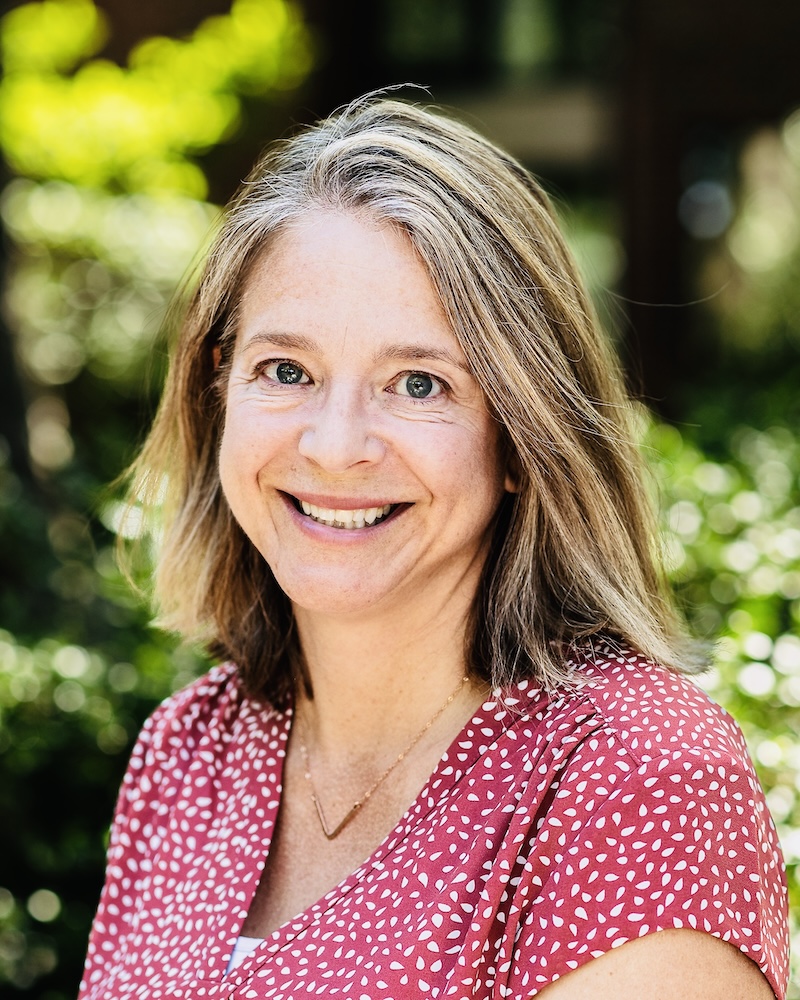 While Russia’s war in Ukraine has stalled national climate policy and limited field research, efforts toward climate adaptation—such as flood control, urban greening, and emergency services—continue to expand in diverse and decentralized ways. This project explores how AI can help locate, organize, and analyze fragmented data on regional adaptation policies and projects, which are often hard to access through traditional methods. By testing AI tools on English-language sources focused on Russia, with the goal of scaling analysis to Russian-language materials, the project aims to evaluate the potential of AI-driven data collection for political science research.
While Russia’s war in Ukraine has stalled national climate policy and limited field research, efforts toward climate adaptation—such as flood control, urban greening, and emergency services—continue to expand in diverse and decentralized ways. This project explores how AI can help locate, organize, and analyze fragmented data on regional adaptation policies and projects, which are often hard to access through traditional methods. By testing AI tools on English-language sources focused on Russia, with the goal of scaling analysis to Russian-language materials, the project aims to evaluate the potential of AI-driven data collection for political science research.
Generative AI Hackathon
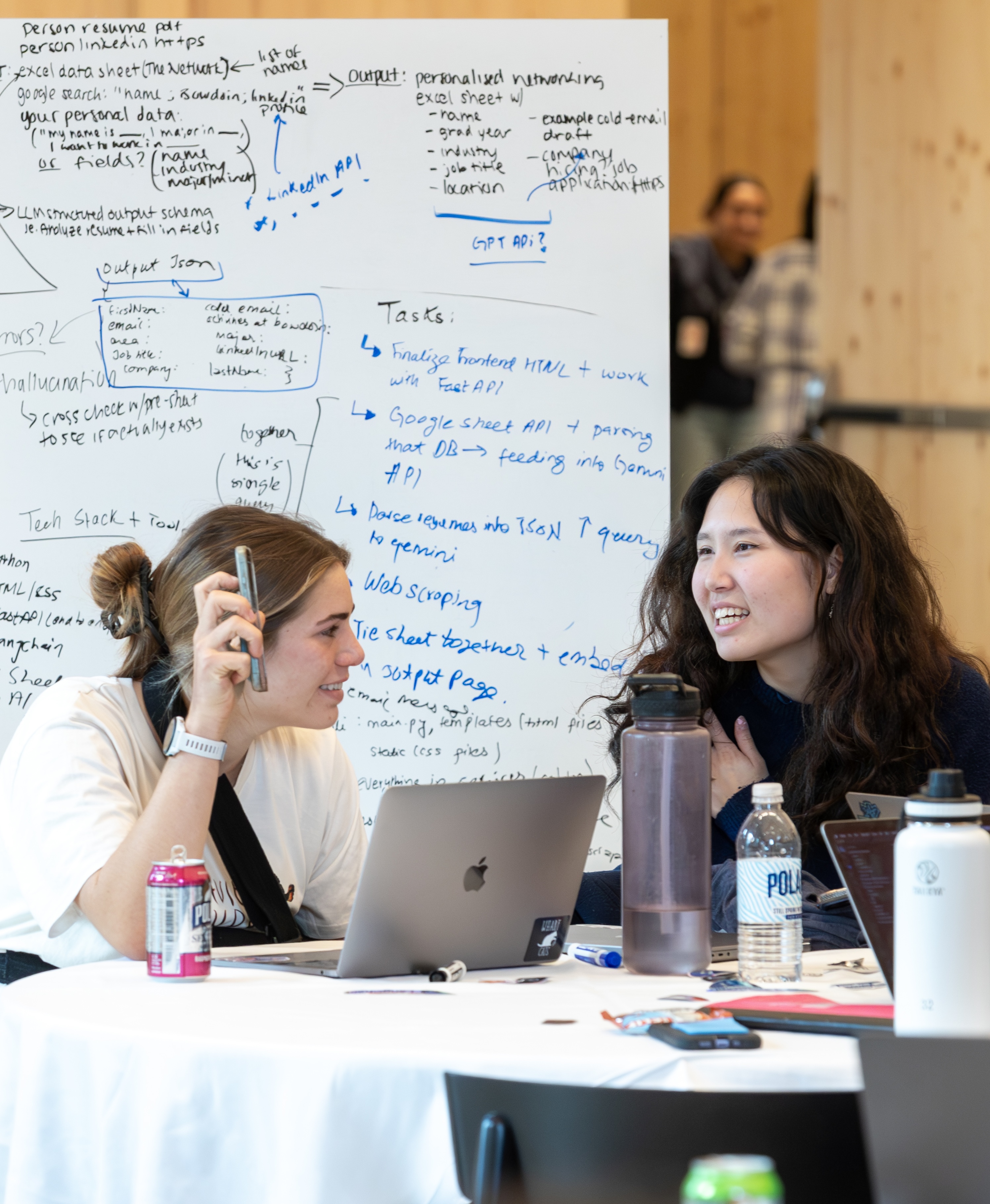 Led by Christopher Martin, Visiting Lecturer and Computer Science, a day-long Generative AI Hackathon brought together approximately sixty students from Bowdoin, Bates, and Colby. Supported by alumni, faculty, and staff, students of all experience levels built AI-powered projects, including apps for tracking sustainable habits, connecting students with tutors, and simulating electromagnetic particles. Throughout the day, workshops covered technical foundations of LLMs and philosophical questions about AI, while alumni software engineers discussed AI's workplace impact. By creating a collaborative space for exploration, the hackathon enabled students to understand AI's capabilities and limitations while developing critical perspectives on responsible AI use. Read the full story about the hackathon.
Led by Christopher Martin, Visiting Lecturer and Computer Science, a day-long Generative AI Hackathon brought together approximately sixty students from Bowdoin, Bates, and Colby. Supported by alumni, faculty, and staff, students of all experience levels built AI-powered projects, including apps for tracking sustainable habits, connecting students with tutors, and simulating electromagnetic particles. Throughout the day, workshops covered technical foundations of LLMs and philosophical questions about AI, while alumni software engineers discussed AI's workplace impact. By creating a collaborative space for exploration, the hackathon enabled students to understand AI's capabilities and limitations while developing critical perspectives on responsible AI use. Read the full story about the hackathon.
Christian Puma Ninacuri, Lecturer in Hispanic Studies
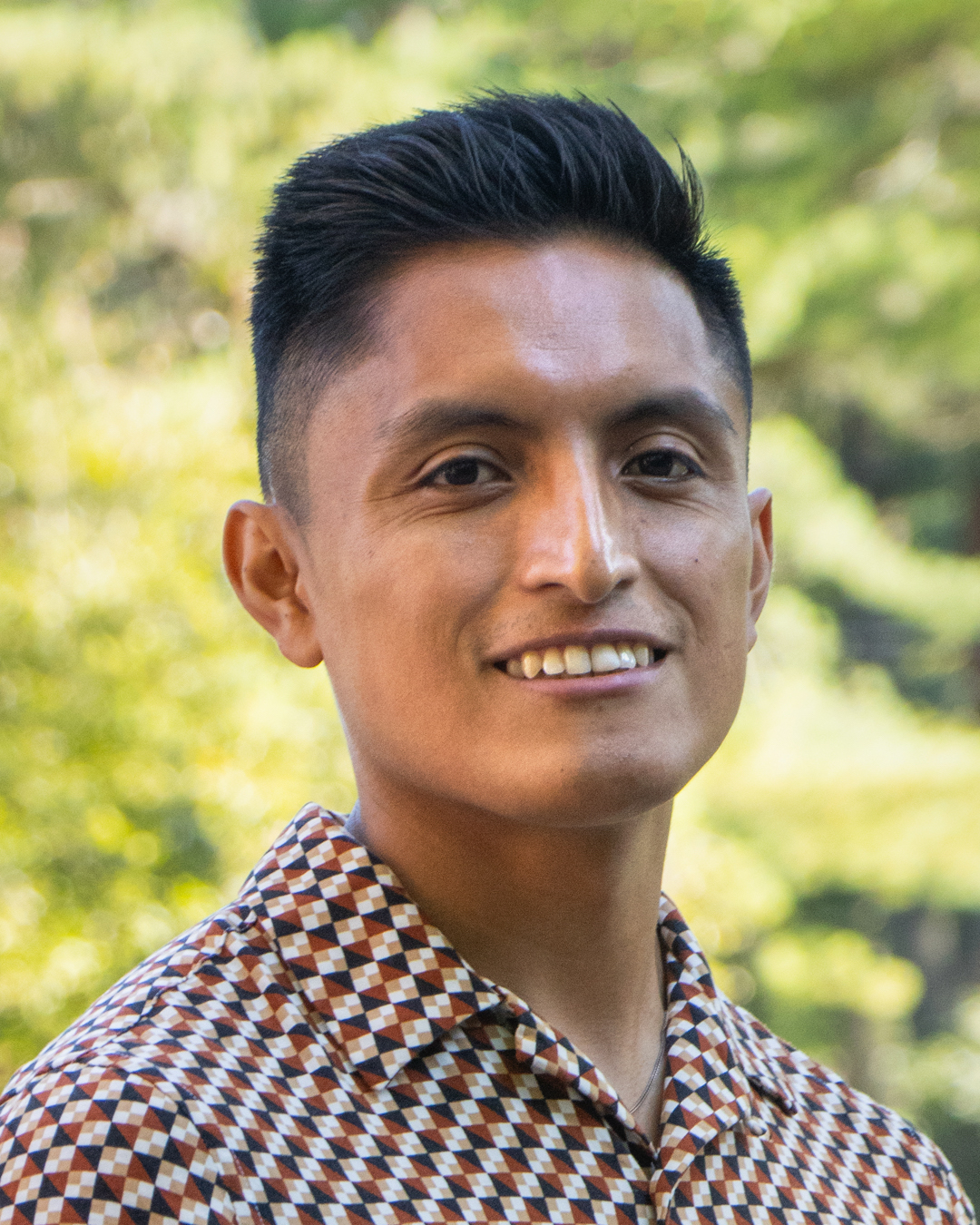 Through thoughtful integration of an AI tool into intermediate Spanish courses, this project aims to reduce student anxiety while enhancing language proficiency, complementing rather than replacing human interaction. This project pilots My Conversation Trainer, an AI-powered platform that allows students to practice speaking and listening skills in a low-stakes environment outside of class. The tool provides personalized, real-time feedback and enables instructors to customize conversation scenarios reflecting real-world language use. Piloting the project over the summer, research assistants Cameron Shelly, Sharifa Hurnawar, and Liam Rodríguez highlighted the platform's judgment-free practice opportunities and ability to reinforce classroom learning.
Through thoughtful integration of an AI tool into intermediate Spanish courses, this project aims to reduce student anxiety while enhancing language proficiency, complementing rather than replacing human interaction. This project pilots My Conversation Trainer, an AI-powered platform that allows students to practice speaking and listening skills in a low-stakes environment outside of class. The tool provides personalized, real-time feedback and enables instructors to customize conversation scenarios reflecting real-world language use. Piloting the project over the summer, research assistants Cameron Shelly, Sharifa Hurnawar, and Liam Rodríguez highlighted the platform's judgment-free practice opportunities and ability to reinforce classroom learning.
Special Collections & Archives
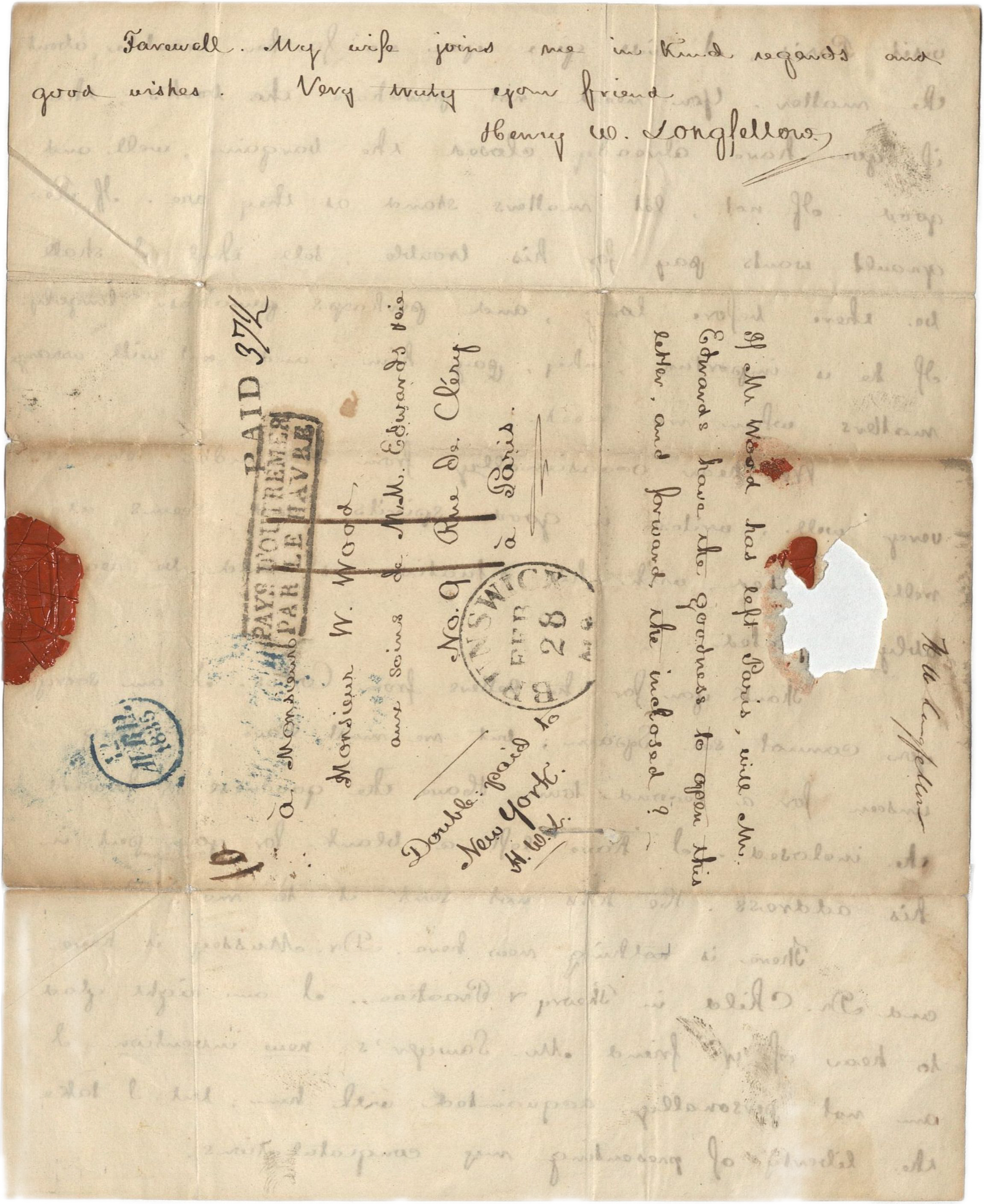 Describing and transcribing historical materials is slow, labor-intensive work. To explore solutions, special collections and archives staff at Bowdoin, Bates, and Colby convened for a full-day workshop to examine the implications of generative AI for archives and archival research. Tom Scheinfeldt, Professor of Digital Media and Design at the University of Connecticut, served as the keynote speaker and has published his remarks. Participants shared demonstration projects illustrating the promise and pitfalls of using generative AI to automate the description of historic photographs and transcription of manuscripts, including a recently discovered letter from Henry Wadsworth Longfellow. The workshop sparked deep conversations and future collaborations between institutions.
Describing and transcribing historical materials is slow, labor-intensive work. To explore solutions, special collections and archives staff at Bowdoin, Bates, and Colby convened for a full-day workshop to examine the implications of generative AI for archives and archival research. Tom Scheinfeldt, Professor of Digital Media and Design at the University of Connecticut, served as the keynote speaker and has published his remarks. Participants shared demonstration projects illustrating the promise and pitfalls of using generative AI to automate the description of historic photographs and transcription of manuscripts, including a recently discovered letter from Henry Wadsworth Longfellow. The workshop sparked deep conversations and future collaborations between institutions.
Additional projects funded by Explore AI grants:
Jeová Farias, Assistant Professor of Computer Science, and Fernando Nascimento, Assistant Professor of Digital and Computational Studies
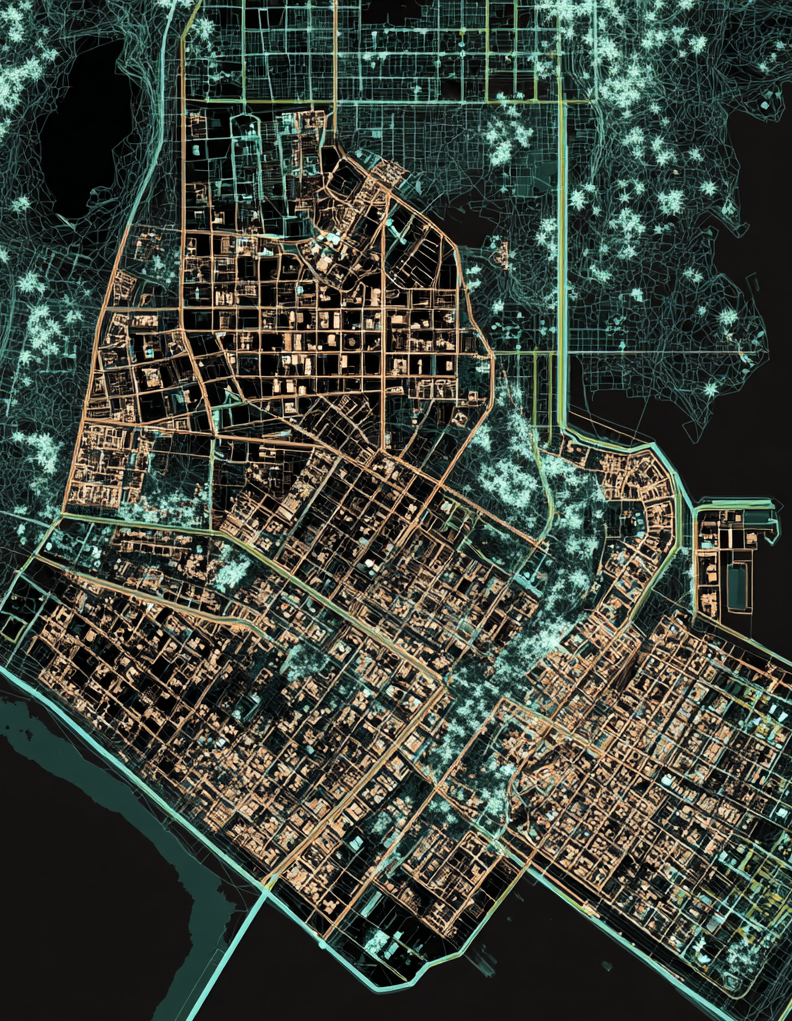 Using computer vision and deep learning, this project develops methods and explores the limitations of trying to predict human poverty from public data sources such as satellite imagery, street-view images, and environmental data. Moving beyond income-based measures, the work trains models to predict multidimensional poverty metrics in areas where traditional surveys are costly or impossible. Combining advanced statistical techniques and diverse data sources, these methods aim to provide tools for poverty monitoring and policymaking while advancing understanding of how poverty emerges across locations. This project also raises critical questions about the inherent limitations of such models and strategies to prevent applications misaligned with the common good.
Using computer vision and deep learning, this project develops methods and explores the limitations of trying to predict human poverty from public data sources such as satellite imagery, street-view images, and environmental data. Moving beyond income-based measures, the work trains models to predict multidimensional poverty metrics in areas where traditional surveys are costly or impossible. Combining advanced statistical techniques and diverse data sources, these methods aim to provide tools for poverty monitoring and policymaking while advancing understanding of how poverty emerges across locations. This project also raises critical questions about the inherent limitations of such models and strategies to prevent applications misaligned with the common good.
Soohyun Cho, Assistant Professor of Government and Legal Studies
 In collaboration with Kyuwon Lee (Assistant Professor at the University of Southern California), this project examines how administrative burdens shape citizens' attitudes toward AI in governance. While AI adoption in government is often viewed skeptically, citizens may support it when it reduces bureaucratic inefficiencies. Using a U.S.-based survey experiment, this project tests whether exposure to administrative delays in benefit processing increases support for AI-based alternatives. Findings will inform debates on technology adoption, trust in government, and the legitimacy of AI-driven governance.
In collaboration with Kyuwon Lee (Assistant Professor at the University of Southern California), this project examines how administrative burdens shape citizens' attitudes toward AI in governance. While AI adoption in government is often viewed skeptically, citizens may support it when it reduces bureaucratic inefficiencies. Using a U.S.-based survey experiment, this project tests whether exposure to administrative delays in benefit processing increases support for AI-based alternatives. Findings will inform debates on technology adoption, trust in government, and the legitimacy of AI-driven governance.
Erik Nelson, Professor of Economics
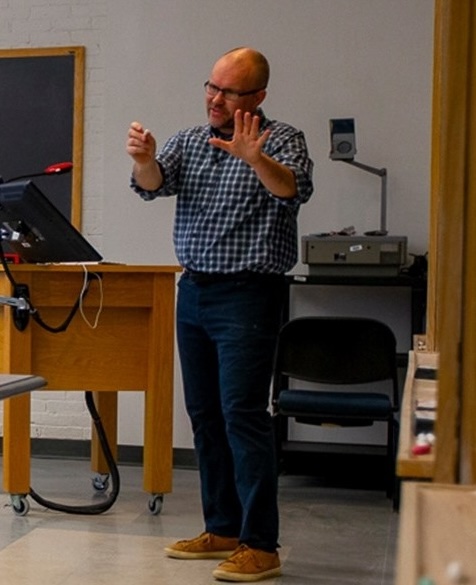 For nearly 30 years, the US Environmental Protection Agency (EPA) has produced a national inventory of US greenhouse gas emissions and removals. Today, this inventory faces an uncertain future as key data collection programs and reporting processes risk being downsized or discontinued. This project seeks to develop an AI expert that can reproduce the EPA’s inventory methods, ensuring that accurate, transparent, and publicly available emissions data continue even if official reporting is disrupted.
For nearly 30 years, the US Environmental Protection Agency (EPA) has produced a national inventory of US greenhouse gas emissions and removals. Today, this inventory faces an uncertain future as key data collection programs and reporting processes risk being downsized or discontinued. This project seeks to develop an AI expert that can reproduce the EPA’s inventory methods, ensuring that accurate, transparent, and publicly available emissions data continue even if official reporting is disrupted.
Nadia Celis, Professor of Romance Languages and Literatures and Latin American, Caribbean, and Latinx Studies
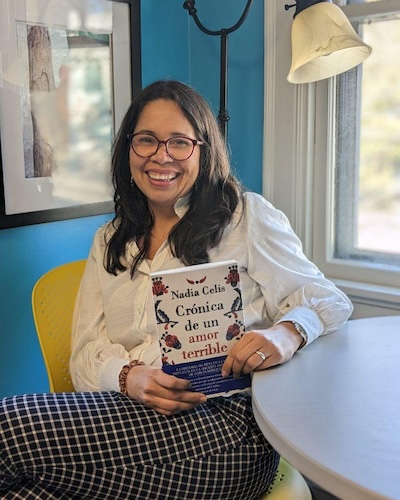 As AI systems become increasingly autonomous, it is urgent to examine how they reflect and reproduce cultural values. This project brings a humanistic, gender-aware lens to the study of generative AI, interrogating how conceptions of “love”—a powerful vector of intimacy, care, and control—are encoded in large language models (LLMs). Combining interpretive analysis and computational experimentation, it investigates the textual bases that shape LLMs’ responses and explores how gendered power dynamics manifest in AI-generated narratives about love. Building on prior research into the cultural interplay of love, gender, and power, the project aims to prototype a platform that allows users to probe bias in generative AI, test ethical scenarios, and evaluate strategies for generating more equitable outputs.
As AI systems become increasingly autonomous, it is urgent to examine how they reflect and reproduce cultural values. This project brings a humanistic, gender-aware lens to the study of generative AI, interrogating how conceptions of “love”—a powerful vector of intimacy, care, and control—are encoded in large language models (LLMs). Combining interpretive analysis and computational experimentation, it investigates the textual bases that shape LLMs’ responses and explores how gendered power dynamics manifest in AI-generated narratives about love. Building on prior research into the cultural interplay of love, gender, and power, the project aims to prototype a platform that allows users to probe bias in generative AI, test ethical scenarios, and evaluate strategies for generating more equitable outputs.
Liam Taylor, Doherty Kent Island Postdoctoral Scholar in Biology
 Leach's Storm-Petrel populations are declining, but the more we learn, the more we disturb them. This project explores how artificial intelligence can be used to help break this fundamental tradeoff. By training AI models on 70 years of data from Kent Island, researchers will be able to detect critical biological events such as egg laying, hatching, chick growth, using only low-disturbance sensors. Solar-powered devices will stream real-time data to interactive dashboards, allowing scientists to monitor vulnerable seabirds without the intrusive methods traditional research requires. This project pioneers conservation technology that protects wildlife while advancing scientific understanding.
Leach's Storm-Petrel populations are declining, but the more we learn, the more we disturb them. This project explores how artificial intelligence can be used to help break this fundamental tradeoff. By training AI models on 70 years of data from Kent Island, researchers will be able to detect critical biological events such as egg laying, hatching, chick growth, using only low-disturbance sensors. Solar-powered devices will stream real-time data to interactive dashboards, allowing scientists to monitor vulnerable seabirds without the intrusive methods traditional research requires. This project pioneers conservation technology that protects wildlife while advancing scientific understanding.
Abigail Killeen, Professor of Theater
 Artificial Intelligence is not intelligent, but it is present, powerful, and pervasive. Staging Intelligence uses Shakespeare in performance to throw the realities introduced and perpetuated by AI into sharp relief. By juxtaposing machine learning methodologies with some of Shakespeare’s most celebrated work, audiences will encounter a thoughtful exploration of generative AI’s possibilities—and its dangers—in real time, in community.
Artificial Intelligence is not intelligent, but it is present, powerful, and pervasive. Staging Intelligence uses Shakespeare in performance to throw the realities introduced and perpetuated by AI into sharp relief. By juxtaposing machine learning methodologies with some of Shakespeare’s most celebrated work, audiences will encounter a thoughtful exploration of generative AI’s possibilities—and its dangers—in real time, in community.